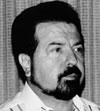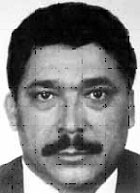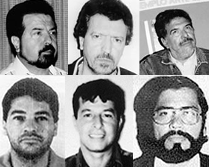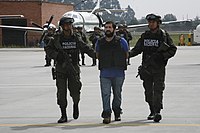
Gilberto José Rodríguez Orejuela was a Colombian drug lord and one of the leaders of the Cali Cartel. Orejuela formed the cartel with his brother, Miguel Rodríguez Orejuela, José Santacruz Londoño, and Hélmer Herrera. The cartel emerged to prominence in the early 1990s, and was estimated to control about 80 and 90 percent of the American and European cocaine markets respectively in the mid-1990s. Rodríguez Orejuela was captured after a 1995 police campaign by Colombian authorities and sentenced to 15 years in prison. He obtained early release in 2002, and was re-arrested in 2003, after which he was extradited to the United States. There, he was sentenced to 30 years in prison, where he died in 2022.
Carlos Castaño Gil was a Colombian paramilitary leader who was a founder of the Peasant Self-Defenders of Córdoba and Urabá (ACCU), a far-right paramilitary organisation in Colombia and a former member of the Medellin Cartel. Castaño and his brothers Fidel and Vicente founded the ACCU after their father was kidnapped and killed by the Revolutionary Armed Forces of Colombia (FARC), in association with other enemies or victims of the guerrillas. The ACCU later became one of the founding members of the United Self-Defense Forces of Colombia (AUC).
The Norte del Valle Cartel, or North Valley Cartel, was a drug cartel that operated principally in the north of the Valle del Cauca department of Colombia, most notably the coastal city of Buenaventura. It rose to prominence during the 1990s, after the Cali and Medellín Cartels fragmented, and it was known as one of the most powerful organizations in the illegal drug trade. The drug cartel was led by the brothers Luis Enrique and Javier Antonio Calle Serna, alias "Los Comba", until its takedown in 2008 by the authorities of Colombia and Venezuela, with cooperation of the United States DEA.
Diego León Montoya Sánchez, also known as Don Diego, is a Colombian former crime boss and leader of the Norte del Valle drug cartel. On October 25, 2002, Montoya was listed as a Specially Designated Narcotics Trafficker on the United States Department of Treasury's Specially Designated National List.
Fidel Antonio Castaño Gila.k.a.Rambo was a Colombian drug lord and paramilitary who was among the founders of Los Pepes and the Peasant Self-Defense Forces of Cordoba and Uraba (ACCU), a paramilitary group which ultimately became a member of the larger United Self-Defense Forces of Colombia (AUC) from which he became its leader until his death in 1994. He was also the brother of Vicente Castaño, the presumed chief of the narco-paramilitary group Águilas Negras, and Carlos Castaño Gil, founder and leader of the AUC paramilitary forces until his death. He is the grandfather of Gabriella Castaño. There is a theory that Fidel Castaño is still alive as there is no proof of him being dead and was the one that also killed Victor “Chepe” Crespo.

Diego Fernando Murillo Bejarano, also known as Don Berna or Adolfo Paz, is a former leader of the United Self-Defense Forces of Colombia paramilitary group, as well as the leader of The Office of Envigado cartel.

Juan Carlos Ramírez Abadía is a drug trafficker who, until his capture, was one of the leaders of the North Valley Cartel, who was wanted on drug smuggling, murder and RICO charges in the United States of America. In addition to the trafficking of cocaine, it is believed Ramírez also participated in money laundering and trafficking of heroin. Through Ramírez’ illegal enterprise, he has amassed a fortune estimated at $1.8 billion by the US Department of State. He has been cited as "... one of the most powerful and most elusive drug traffickers in Colombia" by Adam J. Szubin, Director of the U.S. Department of the Treasury's Office of Foreign Assets Control (OFAC).

Francisco Hélmer Herrera Buitrago also known as "Pacho" and "H7", was a Colombian drug trafficker, fourth in command in the Cali Cartel, and believed to be the son of Benjamín Herrera Zuleta.

The illegal drug trade in Colombia has, since the 1970s, centered successively on four major drug trafficking cartels: Medellín, Cali, Norte del Valle, and North Coast, as well as several bandas criminales, or BACRIMs. The trade eventually created a new social class and influenced several aspects of Colombian culture, economics, and politics.

Wilber Alirio Varela Fajardo, also known as Jabón ("Soap"), was a Colombian drug trafficker. He was the leader of the Norte del Valle Cartel. A Racketeer Influenced and Corrupt Organizations Act indictment was filed in the District Court of the District of Columbia by the Narcotics and Dangerous Drugs Section of the United States Department of Justice Criminal Division against the leaders of the Norte del Valle Cartel, including Varela. According to the indictment, the Norte del Valle Cartel exported approximately 500 metric tons of cocaine worth over $10 billion from Colombia to the United States, often through Mexico, between 1990 and 2004. The indictment was unsealed in May 2004. A provisional arrest warrant was issued and was sent to the U.S. Embassy in Bogotá.

Víctor Manuel Mejía Múnera, aka "El Mellizo " or "Pablo Arauca", was a Colombian drug lord and former paramilitary leader along twin brother Miguel Ángel of the United Self-Defense Forces of Colombia (AUC) commanding the Bloque Vencedores de Arauca which demobilized in 2006.

Miguel Ángel Mejía Múnera aka "El Mellizo" or "Pablo Mejía" or "Rafael Mejia" is a presumed Colombian drug lord and former paramilitary leader. Along with brother Víctor Manuel he created a drug cartel called "Los Nevados" out of a former paramilitary which they bought for US$ million dollars. The cartel buys illegal drugs from Daniel Barrera Barrera another drug lord working along with both the Revolutionary Armed Forces of Colombia (FARC) as well as paramilitaries. The brothers have also been known to employ many ex-military and special bodyguards like Francisco Rivas Gonzales "Superman" who has disappeared, and believed to be somewhere in Mexico or Central America. Mejía-Múnera has a son who was born in December 6 in NY; he is presumed to be living with his mother in the US. Exact whereabouts are unknown. He also has two daughters whose whereabouts are unknown.
José Miguel Arroyave Ruiz aka "Arcángel" or also "the Chemist" was one of the top paramilitary leaders and commander of the Centaurs bloc of the United Self-Defense Forces of Colombia (AUC), a 5,000-strong private militia active in the sparsely populated grasslands of eastern Colombia. He was also a powerful figure within the United Self-Defense Forces of Colombia (AUC), an umbrella organization bringing together right-wing paramilitary groups from all over the country. He was well known for being a ruthless fighter against guerrilla groups, and for being able to evict these rebel groups and take control of their territories. The Centaurs bloc was one of the largest and most powerful groups within the AUC, and was very well organized, to the point that they even had a running web page that is no longer in service (www.bloquecentauros.org).
Carlos Mario Jiménez Naranjo aka "Macaco" is a Colombian former drug lord and paramilitary leader. Jimenez was a member of the United Self-Defense Forces of Colombia (AUC) paramilitary group which demobilized between 2005 and 2007. Jimenez ordered the assassination of numerous people in the region of the Santander and North Santander specially in the city of Barrancabermeja where his organization confronted and defeated the National Liberation Army (ELN) for the control of the territory. Jimenez was the commander in chief of the Central Bolívar Bloc of the AUC.

Daniel Rendón Herrera is a Colombian drug lord. He was captured on 15 April 2009 while hiding in a jungle.

Los Rastrojos is a Colombian drug cartel and paramilitary group engaged in the Colombian armed conflict. The group was formed by Norte del Valle cartel capo Wilber Varela, alias "Jabon" and one of his right-hand men, "Diego Rastrojo", around 2004 when Varela fell out with fellow-capo Diego Leon Montoya, alias "Don Diego". The group became independent after the murder of its main founder in Venezuela in 2008 and at its height was one of the most important drug trafficking organizations in Colombia.

The Clan del Golfo, also known as Gaitanist Self-Defense Forces of Colombia and formerly called Los Urabeños and Clan Úsuga, is a prominent Colombian neo-paramilitary group and currently the country's largest drug cartel.
La Oficina de Envigado is a drug cartel and criminal organization originally founded as an enforcement wing and debt collection service of Pablo Escobar's Medellín Cartel. Despite being noted for its historical affiliation with drug trafficking and other organized crime activities, Oficina de Envigado's criminal activities were no longer centered on direct involvement in such activity by 2019 and are now mainly focused on providing services to lower level drug traffickers and mafia groups. It operates throughout Colombia, but mainly in the cities of Medellín and Envigado. It also controlled extortion, gambling, and money laundering businesses within the Valle de Aburrá that surrounds Medellín. It positioned itself as the chief mediator and debt collector in drug trafficking disputes and maintained major connections with Colombian paramilitaries and guerillas.

Drug barons of Colombia refer to some of the most notable drug lords which operate in illegal drug trafficking in Colombia. Several of them, notably Pablo Escobar, were long considered among the world's most dangerous and most wanted men by U.S. intelligence. "Ruthless and immensely powerful", several political leaders, such as President Virgilio Barco Vargas, became convinced that the drug lords were becoming so powerful that they could oust the formal government and run the country.

Dairo Antonio Úsuga David is a Colombian drug lord. Úsuga is the leader of the drug trafficking group the Gulf Clan, and is known by his nickname Otoniel. He is accused of sending dozens of shipments of cocaine to the United States, killing police officers, recruiting minors, and sexually abusing children, among other crimes. After being sought by Colombian authorities for a decade, he was captured and arrested in October 2021, and extradited to the United States in May 2022. At the time of his capture, 132 warrants for his arrest had been issued. He pled guilty in New York to charges related to his time as Gulf Clan leader and is currently serving a 45-year sentence. He also faces coordinated charges in Florida.













